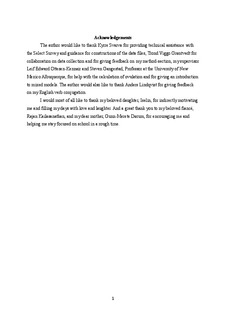| dc.contributor.advisor | Kennair, Leif Edward Ottesen | nb_NO |
| dc.contributor.author | Karlestrand, Sølvi Dørum | nb_NO |
| dc.date.accessioned | 2014-12-19T14:42:47Z | |
| dc.date.available | 2014-12-19T14:42:47Z | |
| dc.date.created | 2013-05-06 | nb_NO |
| dc.date.issued | 2013 | nb_NO |
| dc.identifier | 619821 | nb_NO |
| dc.identifier.uri | http://hdl.handle.net/11250/271004 | |
| dc.description.abstract | Women who use hormonal contraceptives have been shown to report more intense affective responses to partner infidelity than women with a natural cycle. Also, previous research suggests that female jealousy is sensitive to hormonal changes when naturally cycling, with a peak around ovulation, while women using hormonal contraceptives are less sensitive.
This research is aimed at exploring women`s perception of couple conflicts in line with predictions derived from evolutionary theory. A factor analysis yielded four dimensions within 19 couple conflicts that were related to jealousy, emotional support, time and effort, and commitment. We tested the hypotheses that women who use hormonal contraceptives will react more strongly to jealousy-provoking scenarios and overall conflicts compared to women with a natural menstrual cycle. We also tested the hypotheses that naturally cycling women would show an increase in their emotional response to jealousy-provoking scenarios at days with high fertility risk. We expected that their emotional response to the scenarios infidelity, lack of emotional support, time and effort and lack of commitment, would increase if they perceived their partners as attractive.
By using an online questionnaire, we followed women who were currently in a relationship with age ranging from 18 to 30 years weekly for 12 weeks. Results show a significant difference between women using hormonal contraceptives and naturally cycling women. Women using hormonal contraceptives responded to be more upset by scenarios indicating infidelity, than did naturally cycling women (p < .05), but not on the overall conflicts. However, some unexpected differences on the single scenarios where discovered.
For the analysis concerning the fertility-effect, no significant main effect was found. However, our hypotheses were not supported (p > .001), Our results did, however, reveal a non-significant trending in the predicted direction indicating that the partner`s attractiveness interact with fertility status and affect how women respond to situations regarding Jealousy and couple conflicts. | nb_NO |
| dc.language | eng | nb_NO |
| dc.publisher | Norges teknisk-naturvitenskapelige universitet, Fakultet for samfunnsvitenskap og teknologiledelse, Psykologisk institutt | nb_NO |
| dc.subject | hormonal contraceptives | en_GB |
| dc.subject | menstrual cycle | en_GB |
| dc.subject | couple conflicts | en_GB |
| dc.subject | jealousy | en_GB |
| dc.subject | Social and Behavioural Science, Law | en_GB |
| dc.title | The Complexity of Romantic Relationship: A Quantitative Study of Women's Emotional Responses to Couple Conflicts in Light of Hormones and Evolutionary Theory | nb_NO |
| dc.type | Master thesis | nb_NO |
| dc.source.pagenumber | 46 | nb_NO |
| dc.contributor.department | Norges teknisk-naturvitenskapelige universitet, Fakultet for samfunnsvitenskap og teknologiledelse, Psykologisk institutt | nb_NO |
